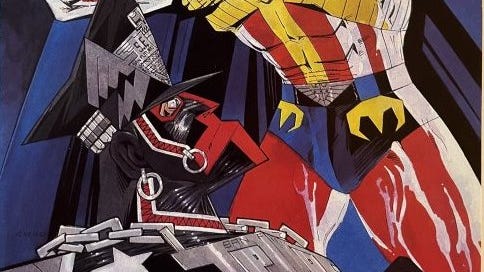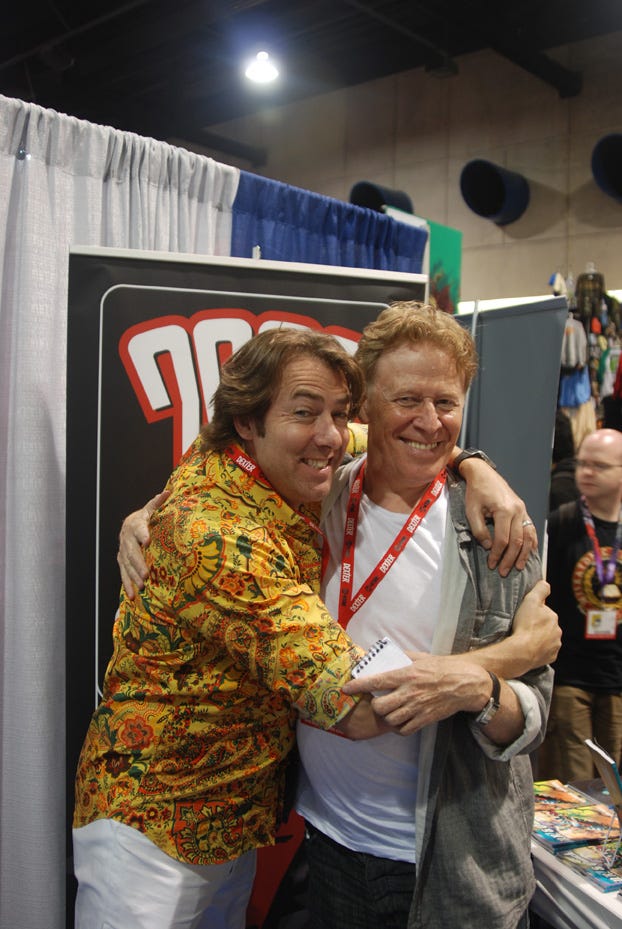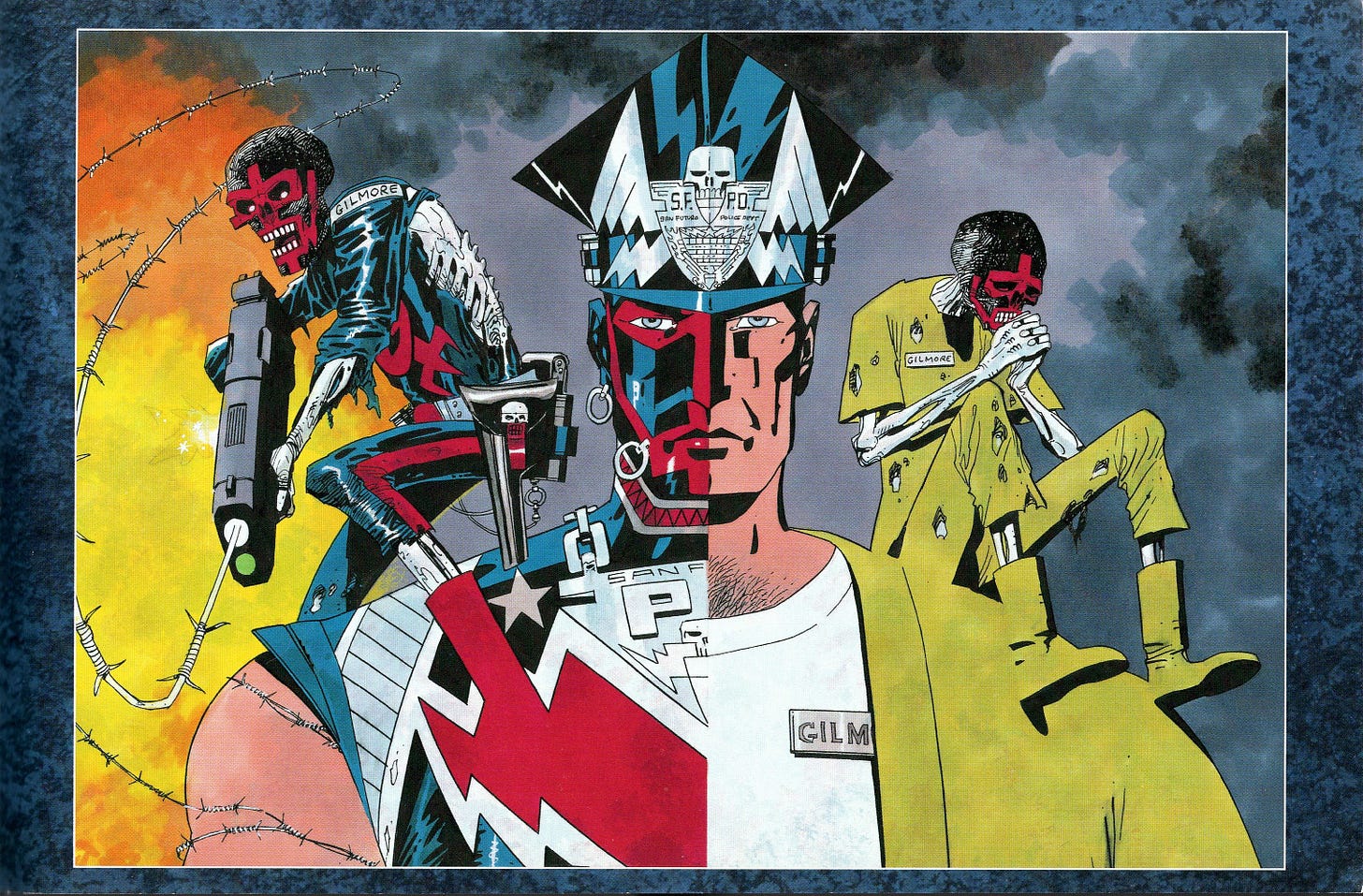Jonathan Ross once asked me, ‘Why do you hate superheroes so much?’
I replied, ‘How long have we got?’
It’s useful to define the Slaves of the Archons in fictional form first, especially as superheroes, because it makes the definition more exacting.
It explains why MARSHAL LAW attacks superheroes with ferocity!
These are all characteristics of the Archons and validates my premise, unless you think it’s all some terrible fluke of fate that humanity is the mess it’s in now
Superheroes are usually middle-class professionals or tycoons like Bruce Wayne.
Rarely ordinary people. So there is a built-in elitism about them. In fiction, Bruce Wayne and other billionaires pose as Saviours.
And in real-life too – like Musk – but to be a billionaire automatically rules them out. As a hero. I’m not aware of one billionaire acting a a benign ruler over their workforce.
It’s all an extension of the original Scarlet Pimpernel – an aristocrat who saves other aristocrats.
It suggests the only people who can be superheroes are the ruling class.
This verges on the masonic. It legitimises the arrogance and superiority of the rich.
It used to be different – like Stan Lee’s Spiderman, who originally showed some genuine warmth and emotion, which I would describe as matriarchal.
I understand some heroes today are very ‘woke’ but without real conviction. As I haven’t read them, I can’t be sure, but they don’t sound like they’re resonating with the audience. If they’re fake, that’s Archontic.
To be a Saviour is also Archontic and is against the Matriarchal concept of self-knowledge and self-reliance.
We need to celebrate ordinary heroes, like my Charley’s War (a World War One soldier) and its forthcoming successor Ragtime Soldier. Instead, we are brainwashed into thinking superheroes are superior heroes when, in fact, they are inferior heroes.
It’s why Marshal Law is a blue collar worker, a hospital orderly.
Often superheroes’ powers are a metaphor for American weapons technology. With lasers, stealth aircraft, bombs etc, they can defeat ordinary people.
In fact they can’t. See Afghanistan and Vietnam.
But it’s celebrating death-dealing weapons technology, rather than GENUINE heroism.
They are a substitute and a distraction for real heroes – often working class – who are ignored.
They are an extension of the Archontic Christian message of a ’Saviour’. Fulfilling our supposed need for a Messiah.
‘The One’ – as in the Matrix and similar celebrations of superheroes.
Superman even has a biblical perspective.
But this diminishes self-reliance and can be fascistic. Looking for a magical leader. The only people who are going to save us are ourselves.
It’s overly American. The dominant global power. They generally celebrate white Caucasian superiority.
So in my UK comic strip Black Siddha (about the magical Indian Siddhis, which are super powers) I had an Indian superhero saying, ‘I can’t be a superhero because I’m not American.’
The values superheroes promote are always SAFE establishment values. They NEVER question the status quo.
E.g. The USA trading with Nazi Germany after hostilities had begun in WW2. Or the USA running a school for torture in Central America. I covered these subjects in Marshal Law.
Superheroes are invariably patriarchal and the portrayal of women is still often sexist.
Obviously, they’ve had to modify their position today, but that’s still the legacy and their underlying subtext.
I was recently invited to participate in a New York debate on superheroes. I couldn’t make it, but I very much endorse a position that came up for the debate
Superheroes can perpetuate stereotypes and/or do little to help problems like poverty and inequality.
There, ordinary heroes do extraordinary things which are rarely celebrated. The Mexican wrestler Super Barrio, for instance, who protects poor people in the barrios from being evicted.
There’s a religious and mythological connection. They’re often Gods.
This reeks of Patriarchy, superiority and the Archons. It’s too repulsive for me to linger on.
True vulnerability (the mark of the Matriarchy) is rarely featured or celebrated.
Thus in Sláine: The Horned God, he actually says at one point that he doesn’t know what to do next. He is admitting his vulnerability. That’s rare in comics.
Medieval Knights were murderous scum who oppressed the serfs and the peoples of other lands during the genocidal Crusades.
Today’s British Knights are tools of the Establishment. They have proven they are ‘safe pairs of hands’ who need rewarding by their masters for sustaining the unequal and unjust status quo.
Chivalry is promoted, but it’s a brazen lie and a fantasy. It’s devised to make Knights feel good about themselves, to preen their egos.
Knights also lead us into masonic territory: a boy’s club, an elite club where important decisions are made into secret. Abuse is also rife in some masonic groups.
Such masonry has elements of the Shadow Religion.
Despite this, Batman is promoted as a force for good as ‘The Dark Knight’.
As I say in Marshal Law, the rich superheroes (like today’s billionaires) are actually terrified that the poor are going to take their wealth away from them. That there will be revolution. That’s the real truth they never talk about.
That they’re actually cowards.
Most popular culture fiction and films feature heroes from wealthy elites. Rarely working class heroes. Such as Ken Loach’s Kes, for instance.
This endless emphasis on elite heroes – such as Sherlock Holmes – is seen as ‘just coincidence’, never deliberate design.
I’ve talked about this in Pageturners. George Orwell reached similar conclusions in his critique of boys’ popular fiction.
In short, superheroes and their ilk have debased and sullied the very word ‘hero’
They are unworthy of the name.
So new generations will find it hard to recognise and celebrate real heroes.
Next week, I’ll try to identify some real-life Slaves of the Archons and define the exact nature of the Archons and why they’re so keen on screwing us up.
Apart from the insightful book by John Lamb Lash I mentioned last week, there’s not much out there that penetrates the veneer of describing them as celestial bad-asses and little else.
Here’s a round-up of typical views of the Archons on the web:
Archons are a species of inorganic beings created by the Demiurge Yaldabaoth to be his main enforcers and builders of the physical universe.
The recurring image of Archons is that of jailers imprisoning the divine spark in human souls held captive in material creation.
Gnosticism is infamous for its conception of the cosmos as the creation of the satanic Demiurge. But along with this entity is a retinue of demonic cosmic powers or Archons that act as co-creators and wardens of this prison universe. Join me as I explore the origins, nature and function of the Archons. From their terrible origins as primeval excretions of the Demiurge, to their dreadful creation of the human physical and psychical body – even a renegade Archon that defied the Demiurge and is even said to have created Jesus Christ.
In Gnosticism, the archons (from Greek arkhon, “ruler”) were malevolent, sadistic beings who controlled the earth, as well as many of the thoughts, feelings, and actions of humans. They assisted their master, the demiurge, with the creation of the world, and continued to help him administer his oppressive rule.
I’ll see how well these descriptions fit the real-life Slaves of the Archons and what Lash has to say about them.







Fantastic! Thanks, David
One of the problems with non-super superheroes is that they need the resources to compete. Also, the US is an aspirational (as well as an exceptionalist) society. Why did the working class vote for Trump - twice? The man has no idea what being working class is like, yet somehow they feel he speaks for them. I wonder if they're still buying eggs? ;)